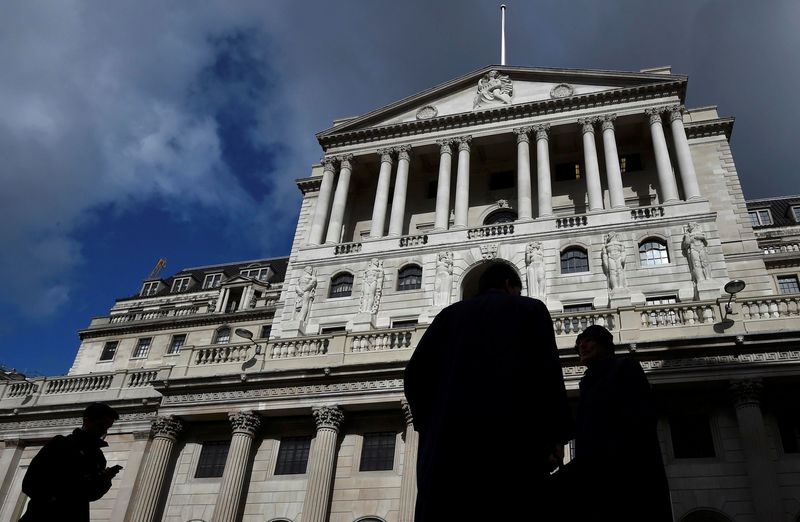By David Milliken
LONDON (Reuters) – British government bonds are on course for their biggest monthly fall since 1994, as surging energy prices create a perfect storm of higher inflation, tighter monetary policy and the prospect of greater government borrowing.
Yields for interest-rate sensitive two-year gilts – as well as for 10-year bonds which factor in longer-term concerns about inflation and debt issuance – have jumped by more this month than any month since May 1994 when there was a slump in prices known as the ‘Great Bond Massacre’.
“What we see right now is a market that is seriously concerned about the levels of inflation, the persistence of inflation, the stickiness of inflation, and to what extent this means that we may have a fairly restrictive monetary policy,” said Theo Chapsalis, fixed income strategist at Morgan Stanley.
Two-year gilt yields touched their highest since November 2008 on Aug. 24 at 2.959%, up from 1.72% at the start of the month, and offered their biggest yield premium relative to German bonds since 2005. Thirty-year gilt yields hit the highest since 2014.
British government bond prices have been under pressure all year, but the most recent sell-off gained momentum after the Bank of England raised interest rates by half a percentage point on Aug. 5, its biggest increase since 1995.
A higher-than-expected July inflation reading of 10.1% – the first time consumer price inflation has hit double digits in 40 years – dealt a further blow on Aug. 17.
The BoE forecasts inflation will peak at just over 13% in October, but many economists think it will go higher in early 2023, with Citi predicting a peak of more than 18% – a level last seen in 1976.
GOVERNMENT BORROWING TO RISE
On Friday, Britain’s energy regulator announced that from October it would raise household energy tariffs by 80% to an average of 3,549 pounds ($4,177) a year, and industry analysts expect further increases next year to almost double that.
These increases do not just mean higher inflation in Britain but also much more government borrowing to subsidise household bills from whichever of Liz Truss or Rishi Sunak succeed Boris Johnson as Conservative leader and prime minister.
“It’s looking increasingly likely that a Truss or indeed a Sunak government will step in with an emergency budget and probably sizeable measures to tackle the impact of rising energy prices,” NatWest Markets rates strategist Imogen Bachra said.
Neither Truss nor Sunak have specified what support they think is needed. Media reports on Sunday said Truss – the front-runner in polls of Conservative Party members – was considering cutting the rate of value-added tax to 5% from 20%, at a cost of around 38 billion pounds a year.
The opposition Labour Party has proposed freezing energy bills, at a cost of around 60 billion pounds a year, similar in scale to the COVID-19 pandemic’s furlough programme.
In April, Britain said it would issue 253 billion pounds of gilts in the 2022/23 financial year.
Uncertainty about the amount of further borrowing had caused Britain’s bonds to underperform those from the United States and Germany, Chapsalis said, as some investors feared Britain could need to issue 50 to 100 billion pounds more debt.
“That issuance can and will be absorbed – but only at the right price. That price means higher yields,” he said, warning that long-dated bonds such as those with a 35-year maturity were the most vulnerable to further price falls.
Unlike during the COVID-19 pandemic, when hundreds of billions of pounds of new debt was lapped up by markets without leading to higher borrowing costs, current high inflation meant bonds were no longer viewed as a safe haven, he added.
HIGHER BOE RATES
British government bond yields are also being pushed higher by what markets see as a more hawkish BoE stance at August’s meeting. The BoE said it was still prepared to raise rates forcefully if needed, despite forecasting a lengthy recession.
Unusually, financial markets expect British interest rates to exceed those in the United States. Rate futures price in BoE rates peaking at 4.25% in June next year, compared with 3.75%-4% for those set by the Federal Reserve.
However, most economists expect the BoE to raise rates far less. A Reuters poll shows BoE rates peaking at 2.5% at the end of this year.
Chapsalis said the divergence likely reflected how financial markets were pricing in not just the single most likely scenario, but also a scenario where the BoE might have to raise rates to 5% or 6% if it lost control of inflation.
The British government bond market also faces headwinds from the beginning of the BoE’s bond sale programme next month. The BoE wants to reduce its gilt holdings by 80 billion pounds over the year through a mix of redemptions and outright sales.
While Chapsalis reckons the impact will be minor, ING economist James Smith said current volatility in the gilt market – with daily moves of more than 20 basis points – “cast a long shadow” over the sales programme.
The BoE has said it will only cancel sales if markets are “very distressed”.
“We don’t argue that the plan should be shelved but a clearer circuit-breaker, which helps avoid adding to market stress, would make sense in our view,” Smith said.
($1 = 0.8496 pounds)
(Reporting by David Milliken; Editing by Christina Fincher)
